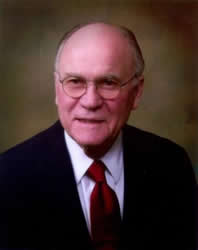

|

|
IN MEMORIAM
Alfred Wheeler Childs
Professor of Public Health, Emeritus
UC Berkeley
1922 – 2006
Alfred Wheeler Childs died on July 5, 2006. He served the University of California for 32 years as an outstanding teacher and a dedicated alumnus. Childs was a distant relative of Benjamin Ide Wheeler, president of the University of California from 1899 to 1919. He was true to his family’s ties to the University, serving the University of California, Berkeley, in many roles over his lifetime. His absence has been deeply felt locally, nationally, and internationally by the many people whose lives he touched.
Al was born in 1922 in San Francisco, the oldest child of Genieve Meloche and Alfred Augustus Childs. He graduated from Sequoia High School in Redwood City in 1940. Childs received a bachelor’s degree in medical science from UC Berkeley in 1943 and a medical degree from UC San Francisco in 1946. He was enlisted in the Army Reserve from 1943 to 1946, and subsequently served in the Air Force as a medical officer from 1947 to 1949, and in the Air Force Reserve from 1949 to 1964. He was a visiting fellow in medicine at Columbia University from 1954 to 1956. In 1962, at the age of 40, Childs volunteered with Project HOPE in Peru.
In 1964, Childs received his master’s degree in public health from Berkeley. His subsequent career bridged the fields of public health and medicine. He served on the faculty of the School of Public Health from 1964 to 1975, while simultaneously serving on the clinical faculties of Stanford University School of Medicine and the University of California, San Francisco. He practiced internal medicine in San Francisco from 1956 to 1962, and in Berkeley from 1975 until his death. Childs served on the medical staffs of Alta Bates Hospital in Berkeley and Presbyterian Hospital in San Francisco, where he directed the artificial kidney unit. At the School of Public Health, Childs taught courses on the organization, financing, and delivery of medical services. One of his teaching and research interests was the emergence of a new organizational form for financing and delivering medical care, the prepaid health plan. He served on the board of directors of one such plan, the HEALS health plan.
Childs spent most of his life working to improve the health of people as a physician, faculty member, and advocate for advances in health care services. He participated in every aspect of patient care, from treating individuals at home and abroad, to directing an artificial kidney unit, to supporting the next generation of public health leaders through active involvement at the School of Public Health. Childs was also a committed and active alumnus. He lent his time and leadership skills to the California Alumni Association, the University Art Museum Council, and the board of directors of the UC Berkeley Public Health Alumni Association. He also represented the School of Public Health on the UC Berkeley Foundation Board of Trustees. In 1993 the dean of the School of Public Health, Patricia Buffler, established the Alfred W. Childs Distinguished Service Awards to recognize faculty and staff who exemplify Childs’s generosity of spirit and commitment to the school. Numerous awards were bestowed on Childs in recognition of his contributions to UC Berkeley. In 1991 he received the California Alumni Citation from UC Berkeley. In 1993 he received an Alumni of the Year Award from the School of Public Health. In 1994 and 2001, he received the Trustees’ Citation from the UC Berkeley Foundation.
Childs enjoyed hiking, contemporary art and music. He served on the board of the San Francisco Contemporary Music Players and was one of the first members of the San Francisco Museum of Modern Art. Al was a caring person. He regularly attended University and School events, greeting faculty, staff, and students warmly, asking about their families and work, and offering encouragement. His positive attitude gave strength to those who needed support during difficult times and made him a model for many professionals now serving in the field of public health. Childs was involved in alumni affairs not as a matter of personal prestige or desire to have influence. Rather, he had a deep, lifelong commitment to the welfare of the University of California. We close this account of this remarkable man with the sentiments of current School of Public Health Dean Stephen Shortell: “Al was a tireless supporter of the School, and we were fortunate to benefit from his leadership and dedication. We were all privileged to work with him.” To this we simply add he will be greatly missed.
Childs was devoted to his family and is survived by his wife, Eunice.
Thomas G. Rundall
Patricia A. Buffler